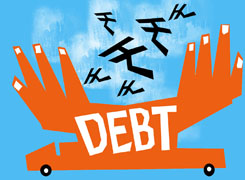Heavily in Debt: How Can I Recover?
Ramalingam Kalirajan |10876 Answers |Ask -Follow
Mutual Funds, Financial Planning Expert - Answered on Feb 05, 2025
He has an MBA in finance from the University of Madras and is a certified financial planner.
He is the director and chief financial planner at Holistic Investment, a Chennai-based firm that offers financial planning and wealth management advice.... more

I am Lisha a kg teacher. I have debt of 40 lakhs. I have net income 25000. How can I manage to recover from debt? Please reply
You have a total debt of Rs. 40 lakhs.
Your net income is Rs. 25,000 per month.
Managing this situation requires planning, discipline, and action.
The key focus should be reducing high-interest loans first.
Increasing income is also necessary to speed up debt repayment.
Prioritising Debt Repayment
List all loans with their interest rates and EMI amounts.
Identify which loans have the highest interest rates.
Prioritise paying off the costliest loan first.
If you have multiple high-interest loans, consider debt consolidation.
Avoid taking new loans or using credit cards for daily expenses.
Reducing Monthly Interest Burden
Rs. 40 lakh debt with Rs. 25,000 income is a serious imbalance.
Your monthly interest burden alone can be unmanageable.
Speak with lenders and request lower interest rates.
Negotiate for an extended loan tenure to reduce EMI.
Avoid late payments to prevent penalties and additional charges.
Earning More Income
With Rs. 25,000 monthly income, repaying Rs. 40 lakh is tough.
Look for additional income sources, even part-time jobs.
Explore online tutoring, weekend coaching, or freelance work.
If possible, upskill to apply for a higher-paying job.
Can you take extra classes at school for additional earnings?
Find small home-based businesses like craft-making or baking.
Use any skills you have to create an extra income stream.
Cutting Down Expenses
Reduce unnecessary expenses wherever possible.
Limit non-essential spending like dining out, entertainment, and subscriptions.
Look for cheaper alternatives for daily expenses.
Create a strict monthly budget and track every expense.
Save on electricity, fuel, and shopping wherever possible.
Avoid personal luxuries until your financial situation improves.
Seeking Family Support
If possible, take help from family members.
Can they provide an interest-free loan for partial debt payment?
Even a small contribution can reduce your debt burden.
Family members may also help with daily expenses for some time.
Transparent communication with them is important.
Avoiding Traps of Loan Apps & Credit Cards
Avoid borrowing from mobile loan apps due to high interest.
Credit cards should not be used for cash withdrawals.
Paying only the minimum due on a credit card leads to more debt.
If you have credit card debt, clear it first due to high interest.
Stick to formal financial institutions for loans.
Exploring Debt Restructuring Options
If you have a bank loan, check if restructuring is possible.
Some banks allow restructuring in financial hardship cases.
This can reduce EMI or provide a temporary relief period.
Approach your lenders with a genuine repayment plan.
Avoid defaulting, as it can hurt your credit score.
Avoiding High-Risk Investments
Do not fall for quick-money schemes or gambling.
Avoid investments that promise unrealistically high returns.
Avoid stock market trading without proper knowledge.
Focus on steady income generation instead of risky bets.
Checking for Any Insurance Policies
If you have LIC, ULIP, or investment-linked insurance, review them.
If surrendering makes sense, reinvest the amount wisely.
Do not stop health insurance, as medical emergencies can worsen finances.
Creating a Step-by-Step Debt Repayment Plan
Pay the minimum due on all loans to avoid penalties.
Focus on repaying the highest-interest loan first.
Negotiate lower interest rates with lenders.
Increase income through side jobs.
Reduce unnecessary expenses to save money.
Explore options like debt consolidation if suitable.
Seek family support where possible.
Avoid new loans unless absolutely necessary.
Finally
Your financial situation is tough but not impossible to fix.
With discipline and effort, debt repayment is possible.
Every small step in saving and earning will help.
Avoid financial mistakes and stay committed to the plan.
With time, your financial situation will improve.
Best Regards,
K. Ramalingam, MBA, CFP
Chief Financial Planner
www.holisticinvestment.in
https://www.youtube.com/@HolisticInvestment
You may like to see similar questions and answers below
Ramalingam Kalirajan |10876 Answers |Ask -Follow
Mutual Funds, Financial Planning Expert - Answered on Nov 08, 2024
Milind Vadjikar | Answer |Ask -Follow
Insurance, Stocks, MF, PF Expert - Answered on Feb 18, 2025
Samraat Jadhav |2499 Answers |Ask -Follow
Stock Market Expert - Answered on Jul 14, 2025
Ramalingam Kalirajan |10876 Answers |Ask -Follow
Mutual Funds, Financial Planning Expert - Answered on Aug 04, 2025
Radheshyam Zanwar |6740 Answers |Ask -Follow
MHT-CET, IIT-JEE, NEET-UG Expert - Answered on Dec 09, 2025
Naveenn Kummar |234 Answers |Ask -Follow
Financial Planner, MF, Insurance Expert - Answered on Dec 09, 2025
Ramalingam Kalirajan |10876 Answers |Ask -Follow
Mutual Funds, Financial Planning Expert - Answered on Dec 09, 2025
Ramalingam Kalirajan |10876 Answers |Ask -Follow
Mutual Funds, Financial Planning Expert - Answered on Dec 09, 2025
Radheshyam Zanwar |6740 Answers |Ask -Follow
MHT-CET, IIT-JEE, NEET-UG Expert - Answered on Dec 09, 2025
Radheshyam Zanwar |6740 Answers |Ask -Follow
MHT-CET, IIT-JEE, NEET-UG Expert - Answered on Dec 09, 2025
Nayagam P P |10853 Answers |Ask -Follow
Career Counsellor - Answered on Dec 09, 2025
Mayank Chandel |2569 Answers |Ask -Follow
IIT-JEE, NEET-UG, SAT, CLAT, CA, CS Exam Expert - Answered on Dec 08, 2025
Mayank Chandel |2569 Answers |Ask -Follow
IIT-JEE, NEET-UG, SAT, CLAT, CA, CS Exam Expert - Answered on Dec 08, 2025

Mayank Chandel |2569 Answers |Ask -Follow
IIT-JEE, NEET-UG, SAT, CLAT, CA, CS Exam Expert - Answered on Dec 08, 2025























